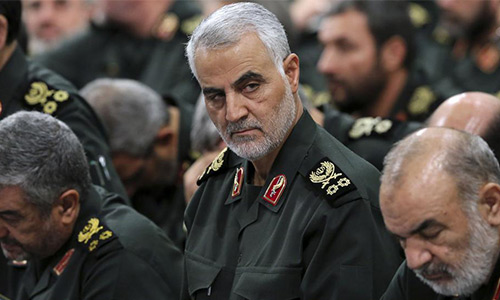The surprise killing of Iranian Major General Qassim Suleimani and a powerful Iraqi militia commander and government official Abu Mahdi al-Muhandis have escalated tension between Tehran and Washington. World leaders have feared the deterioration of situation in the Middle East.
The Pentagon said that the drone attack came “at the direction of the president” and US President Donald Trump and his top aides defended the decision as legal within the authority the president has to protect US forces from attack.
But some analysts and US members of Congress said Trump seems to be crossing the line put forth in the 1973 War Powers Act, by risking a major escalation with Iran.
Democratic Senator Chris Murphy is cited as saying, “This is the equivalent of the Iranians assassinating the US secretary of defense. If the Iranians were to assassinate the US secretary of defense we would consider that an act of war and we would respond disproportionately.”
Democrats called for an immediate explanation of the Trump’s decision and raised doubts about Trump’s strategy versus Iran.
Political analysts believe that Washington’s unilateral decision of designating Suleimani as a foreign terrorist does not give the US to kill him and there is no legal justification.
Iranian officials, including the supreme leader Ayatollah Ali Khamenei, vowed “severe revenge” as the country mourned Suleimani’s death.
Suleimani’s death is likely to further destabilize a region already rocked by nearly a decade of upheaval and fears are rising that the shadow war that had been building between Washington and Tehran could suddenly escalate into a wide-ranging conflict.
Tensions had been escalating between Iran and the US since Trump pulled out of an Obama-era nuclear deal and spiked shortly before the air strike. Meanwhile, Trump’s “maximum pressure” approach could not push Tehran to renegotiate the nuclear deal.
Trump’s predecessors are said to have considered killing Suleimani but did not take the decision for the fear of undue escalation and unnecessary war with Iran.
World leaders, some who have called the attacks illegal and “abuse force”, are highly concerned about the escalating tension in the Middle East and deterioration of regional security.
Trump’s decision, which is described “tremendously bold”, will lead to horrible consequences across the region and the start of a war between Tehran and Washington does not seem unlikely. That is, Trump’s untoward decisions may lead to a war in the Middle East. In such a case, war-torn countries and civilians are likely to bear the brunt of the tension and conflict.
Afghan and Pakistani officials have also aired their concern about the escalation of tension in the region and said that their soils would not be allowed to be used against any states. Calling Suleimani “a prominent figure in anti-Daesh efforts in the region”, Afghan Second Vice President Sarwar Danish said that acts out of international law will distance Afghanistan from peace and stability and assured that Afghanistan would not be used against the interests of any countries. Meanwhile, former Afghan President Hamid Karzai condemned Suleimani’s death.
Caretaker Iraqi Prime Minister Adil Abdul Mahdi has also denounced the strike as a violation of Iraqi sovereignty and an act of aggression against the Iraqi people.
American people also disapproved of Suleimani’s death and launched a demonstration against Trump’s move to send thousands of more troops to the Middle East.
The tension will rise further as Trump has threatened to hit 52 Iranian sites “very hard” if Iran attacks Americans or US assets in retaliation.
The tit-for-tat acts and retaliation could spark a new era of bloodletting and instability. Fearing the ugly consequences, world leaders have urged for restraint.
It is widely believed that Trump’s decision has been neither legal, based on the international law, nor reasonable. Although Trump said that he did not intend to start a war but to end it, this decision proves otherwise. If he is concerned about regional stability, he has to move more cautiously. Trump has already exerted “maximum pressure” on Iran, which has crippled the country’s economy.
Iran is also recommended to take more cautious action so that the regional states are not destabilized.
It is self-explanatory that if statesmen and political leaders take a decision emotionally rather than logically, the consequences would be horrible. Trump’s decision seems to be taken more out of emotion and rage without paying attention to its aftermath. Now US soldiers, military bases, and assets will be more vulnerable and the public hatred would surge against the Trump administration.
Home » Opinion » Suleimani’s Death Likely to Jeopardize Regional Stability
Suleimani’s Death Likely to Jeopardize Regional Stability
| Hujjatullah Zia

